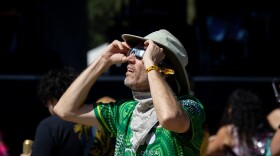Jamie Wallace spends a lot of time thinking about her animals — all 200 of them. Wallace owns and operates Safe in Austin, a 10-acre rescue ranch for abused and neglected animals in Leander.
"We have horses, pigs, cows, sheep, goats, mini horses ... turkeys, chickens, rabbits, guinea pigs, dogs, cats ... tortoises, exotic birds ... oh, and a hedgehog," she said. "Crazy animal lady is usually what everybody calls me."
Recently, Wallace has been thinking about how to care for her animals during what will be the Austin area's first total solar eclipse in more than 600 years.
When the moon passes between the sun and Earth on April 8, Wallace and her animals will be plunged into total darkness for almost four minutes. She wonders: how will they react?
So far, Wallace said, she's had to rely on Google to find out what to expect.
"Our smaller farm animals ... we are definitely gonna pay attention to what happens, and [see] if they do naturally go inside [their coops] like they typically do when the sun's going down," she said. "There's been talk that ... natural predators will come out when it gets dark ... so we want to keep those smaller animals safe."

Wallace said she anticipates other animals could become anxious. To help with that, she's enlisted children from similar traumatic or special needs backgrounds to comfort them.
"The animals can offer reassurance to the kids and the kids can offer reassurance to the animals," she said. "It’s what we get to see every day ... but to watch it in some huge natural phenomenon kind of happening is ... just gonna be really cool."
There's not a lot of research into animal behavior during solar eclipses
Like Wallace, Adam Hartstone-Rose's eclipse plans also include animals. The North Carolina State professor of biological sciences will travel to Texas with a group of researchers to observe animal behavior at the Fort Worth Zoo during the eclipse.
Hartstone-Rose conducted a similar study at the Riverbanks Zoo and Gardens when a total solar eclipse passed over Columbia, South Carolina, in 2017.
"My colleagues and I at the zoo started getting a lot of questions about what would happen with the animals during the eclipse and what would people be able to expect. And the answer was that we had no idea," he said. "There was very, very little research on animal behavior during eclipses."
Hartstone-Rose, along with 40 other researchers, observed 17 species of animals and their behavior during the 2017 eclipse. What they found, he said, was interesting.
Some animals, like brown bears, appeared to have no reaction to the eclipse.
"They were aggressively unimpressed with what was going on. They basically slept through the whole thing," Hartstone-Rose said.
Others, however, seemed to take up their nighttime routines. A few animals, he said, like giraffes, even appeared to show signs of anxiety and distress.
"I’ve spent a lot of time in Africa with giraffes, and they very seldom run around unless they’re being sort of chased by a predator or startled by a vehicle," he said. "And yet, during totality that’s exactly what we saw."
Even stranger, Hartstone-Rose said, some animals appeared to exhibit breeding behavior.
"We saw the Galapagos tortoises, as totality kind of built, they started moving around a lot more, which is in of itself weird for an animal that is a relatively sedentary animal," he said. "But right at the peak of totality, they started mating."
You can participate in animal eclipse research
You can join Hartstone-Rose's research by submitting your animal behavior observations during the eclipse through a project called the Solar Eclipse Safari.
Hartstone-Rose said his team needs people to observe wild animals, like birds or deer, domesticated animals, like pet dogs or cats, and farm animals, like cows or goats, during the eclipse.
"We are interested in collecting data from anywhere where people are," he said. "We are really interested in learning about not just which animals react to an eclipse and how they react, but what extent of totality is necessary ... to cause that reaction."
You can find more information about how to participate in the Solar Eclipse Safari by visiting the project's website.
Copyright 2024 KUT News. To see more, visit KUT News. 9(MDA4OTAxNzAzMDEzMjc0MTc2MzA5ZDZlMw004))







